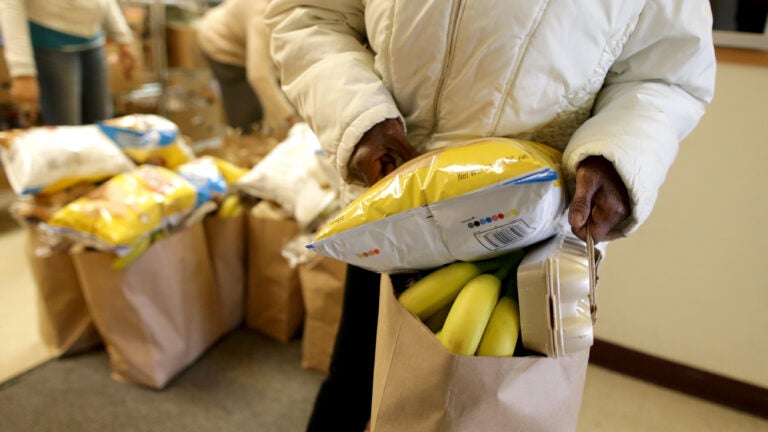Newsletter Signup
Stay up to date on all the latest news from Boston.com

One in three Massachusetts households experienced food insecurity, or the lack of consistent access to adequate food, last year. That finding is just one facet of a worrying picture painted by a new report from The Greater Boston Food Bank.
The report, based on a statewide survey, was released Tuesday. It found that approximately 1.8 million adults experienced household food insecurity in 2022, and one in three people reported running out of food or not having enough money to get more food every month.
Food insecurity rates, which are higher for Black and Hispanic residents, were exacerbated by the pandemic. Just 19% of all Massachusetts households experienced food insecurity in 2019. This jumped to 30% in 2020, 32% in 2021, and 33% in 2022.
Children are being affected. About 36% of households experienced child-level food insecurity in 2022, meaning that a child was hungry, skipped a meal, or did not eat for a whole day because there was not enough money for food.
“I worry my child isn’t getting enough food or enough healthy food. As a growing person, nutrition is so important,” one respondent said.
The survey, which was conducted in collaboration with Mass General Brigham, found that people all over the state have been forced to choose between getting enough food and other essentials. A whopping 70% of households with food insecurity reported choosing between paying for their utility bills and food. More than 60% of these households also had to choose between adequate food and medical care, transportation, and rent or mortgage payments.
“When you get to be my age, you worry over questions like, ‘Are you going to have enough food to eat for the month? Do you have to buy groceries instead of paying for your medicine?’ I have to make that choice most of the time,” another respondent said.
Pandemic-related programs did provide some relief to families, but those benefits are now running out. People using SNAP, the federal Supplemental Nutrition Assistance Program, were allowed to gain extra benefits. Those were eliminated earlier this year. Although Gov. Maura Healey allocated state funds to an extension of some SNAP benefits, those will end on June 2.
The GBFB survey was conducted from November 2022 through January 2023, before the benefits expired. As such, the data released this week represents a “conservative snapshot” of food insecurity conditions.
“It would be a weight off my shoulders to know I could continue to feed my kids without money out of my pocket that I need to spend on things like rent and bills. As a single mother without any financial support, SNAP helps a great deal,” one respondent said.
The survey found that 87% of those who relied on the extra SNAP benefits during the pandemic worried about not being able to afford enough food if the benefits ended.
While the extra SNAP benefits helped, 74% of respondents said they still needed to seek additional food assistance, and 46% said that the SNAP benefits were not enough to get by.
Making things even more difficult for residents are the mounting pressures of inflation. The survey found that most of the people who started using food pantries in 2022 did so because of increased cost of groceries.
Just over half of all households with food insecurity reported using a food pantry in 2022, compared to 27% in 2019. The largest increases in food pantry use were seen among adults identifying as LGBTQ+ and households with children. The data does show that there is less of a stigma for food pantry use now, and there is less perceived discrimination occurring at food pantries.
Ross Cristantiello, a general assignment news reporter for Boston.com since 2022, covers local politics, crime, the environment, and more.
Stay up to date on all the latest news from Boston.com
Stay up to date with everything Boston. Receive the latest news and breaking updates, straight from our newsroom to your inbox.
Conversation
This discussion has ended. Please join elsewhere on Boston.com